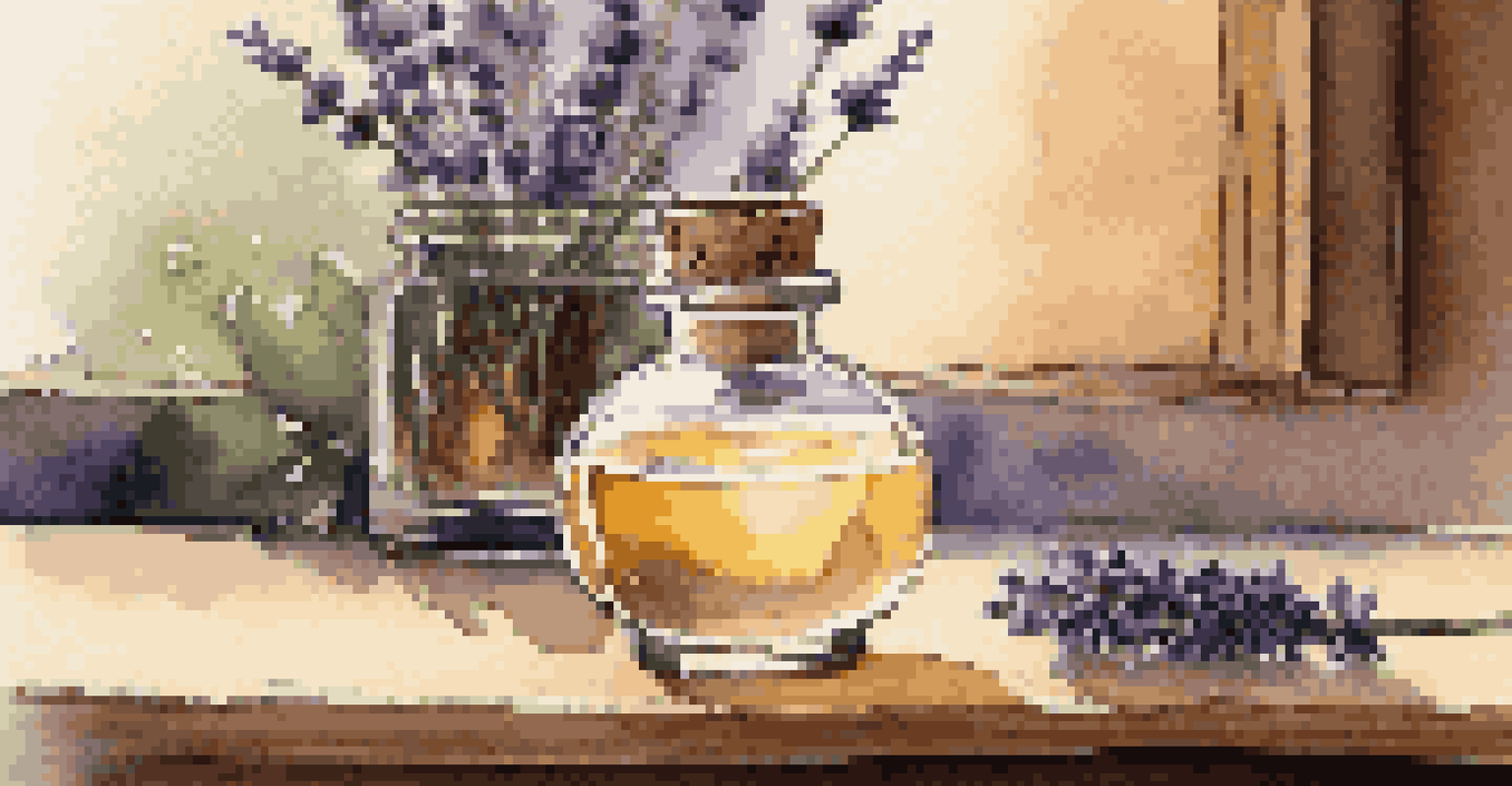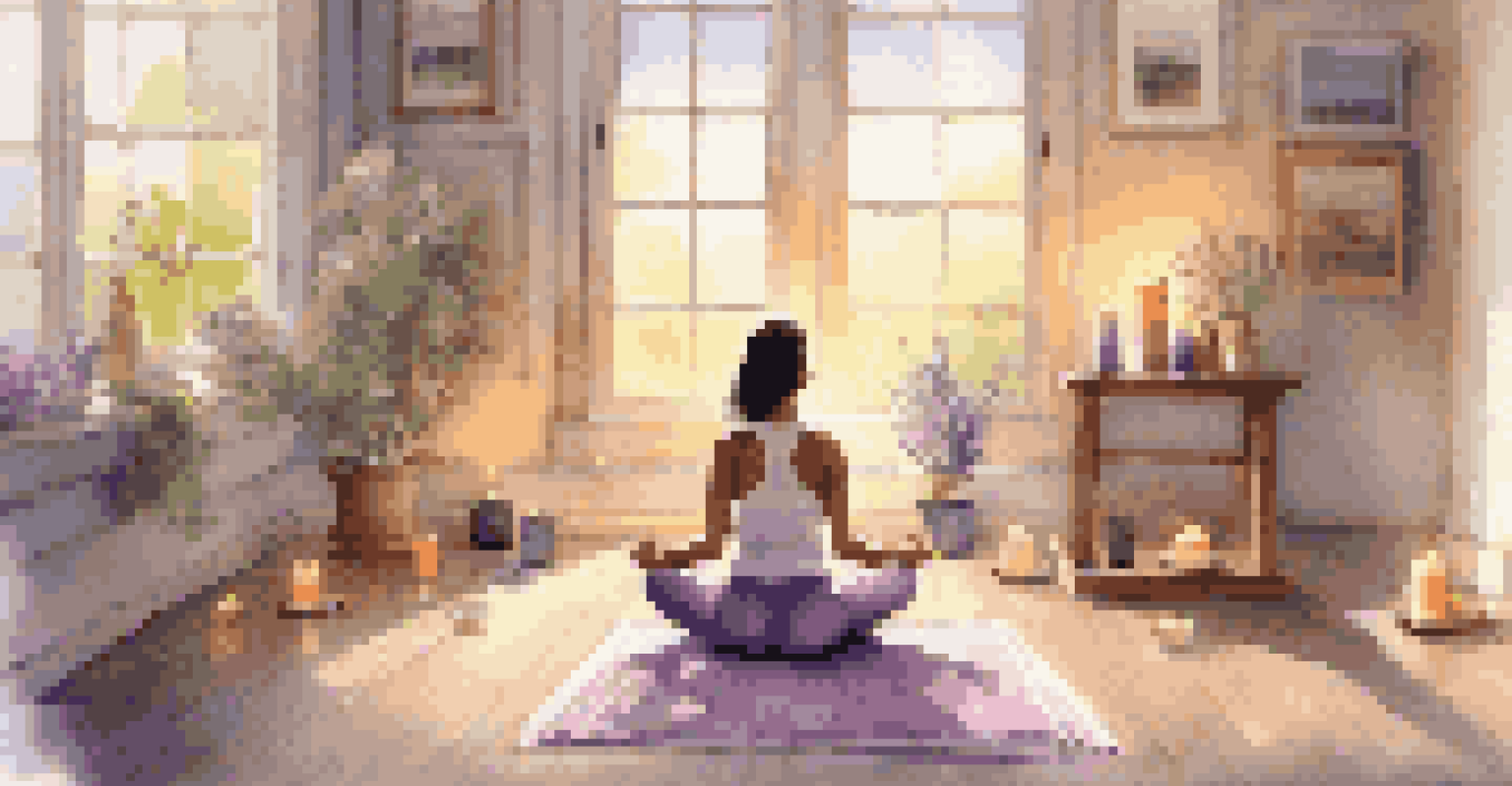Integrating Aromatherapy into Your Routine for Stress Relief

Understanding Aromatherapy: A Gentle Introduction
Aromatherapy is a holistic practice that uses essential oils to promote well-being. These concentrated plant extracts can influence your mood and health through scent. Incorporating aromatherapy into your daily routine can be a wonderful way to manage stress and enhance relaxation.
The greatest weapon against stress is our ability to choose one thought over another.
Imagine walking into a room filled with the calming scent of lavender after a long day. This simple experience can shift your mood and mindset, making it easier to unwind. By understanding the basics of aromatherapy, you can explore its many benefits and applications.
Essential oils like eucalyptus, chamomile, and bergamot are popular for their stress-relief properties. Each oil has unique characteristics, so it's essential to find the right scents that resonate with you. With a little exploration, you can create a personalized aromatherapy routine that enhances your life.
Choosing the Right Essential Oils for Stress Relief
Selecting the right essential oils is crucial for effective aromatherapy. Some of the most popular oils for stress relief include lavender, bergamot, and frankincense. Each of these oils carries unique scents and properties that can help soothe your mind and body.

For instance, lavender is well-known for its calming effects, making it a fantastic option before bedtime. On the other hand, bergamot can uplift your mood and reduce feelings of anxiety. Testing different oils will help you discover which scents resonate with you.
Benefits of Aromatherapy Explained
Aromatherapy utilizes essential oils to promote well-being and can significantly enhance relaxation and stress management.
Consider creating a personal blend that combines several oils for a tailored approach to stress relief. A few drops of lavender mixed with a hint of bergamot can create a delightful aroma that calms your senses while lifting your spirits. Personalization is key in making your aromatherapy experience truly effective.
Incorporating Aromatherapy into Your Daily Routine
Integrating aromatherapy into your daily routine can be simple and enjoyable. Start by adding essential oils to your morning rituals, like diffusing lavender while enjoying your coffee. This can set a calming tone for the day ahead.
Nature does not hurry, yet everything is accomplished.
You can also incorporate aromatherapy into your evening wind-down routine. Try applying a few drops of chamomile oil to your pillow or using a diffuser in your bedroom. This can create a serene atmosphere that encourages relaxation and restful sleep.
Creating a ritual around your aromatherapy practice can enhance its effectiveness. Whether it's a morning routine or a bedtime ritual, consistency will help your body and mind recognize the calming effects of your chosen scents.
Using Diffusers and Other Tools Effectively
Diffusers are one of the most popular ways to enjoy essential oils. They disperse the scent into the air, allowing you to experience the benefits of aromatherapy throughout your space. There are various types of diffusers available, including ultrasonic, nebulizing, and heat diffusers.
When using a diffuser, it's important to follow the manufacturer's instructions for the best results. Typically, you’ll add water and a few drops of your chosen essential oil. The pleasant aroma will fill the room, creating a soothing environment that can help alleviate stress.
Choosing Oils for Stress Relief
Selecting the right essential oils, like lavender and bergamot, is crucial for creating a personalized aromatherapy experience that effectively soothes your mind and body.
Besides diffusers, consider other methods like roller bottles or personal inhalers. These tools allow you to carry your favorite scents with you, ensuring you have a soothing solution wherever you go. Finding the right tools can make your aromatherapy experience even more enjoyable.
Creating a Relaxation Corner at Home
Designing a dedicated relaxation corner at home can enhance your aromatherapy experience. Choose a quiet space where you can unwind and incorporate comfortable seating, calming colors, and your favorite scents. This will be your personal sanctuary for stress relief.
Add elements like candles, plants, or calming music to create a serene atmosphere. Incorporating natural elements can deepen your connection to the space and promote relaxation. Your relaxation corner should be a place you look forward to retreating to after a long day.
Make sure to stock your relaxation corner with your preferred essential oils and diffusers. This space can serve as a reminder to take a moment for yourself amid life's busyness. By nurturing this environment, you prioritize your mental well-being.
Aromatherapy and Mindfulness: A Perfect Pair
Combining aromatherapy with mindfulness practices can amplify stress relief. Mindfulness encourages you to focus on the present moment, and essential oils can help anchor that experience with their soothing scents. This combination creates a powerful tool for managing stress.
For example, during meditation, consider using calming scents like sandalwood or lavender. As you breathe in the aroma, it can enhance your focus and deepen your relaxation. This synergy between scent and mindfulness can help you achieve a greater state of calm.
Incorporating Aromatherapy Daily
Integrating aromatherapy into your daily rituals, such as diffusing oils in the morning or evening, can help establish a calming routine that enhances your overall mental well-being.
Incorporating aromatherapy into your mindfulness practice can be as simple as setting an intention before you begin. Selecting a specific oil to use during your practice can create a sensory cue that signals your mind and body to relax. This can lead to a more fulfilling and effective experience.
Safety Tips for Using Essential Oils Wisely
While essential oils are generally safe, it's important to use them wisely to avoid any adverse effects. Always dilute essential oils before applying them to your skin, as they are highly concentrated. A carrier oil, like coconut or jojoba oil, can help prevent irritation.
Be aware of any allergies or sensitivities you may have to certain oils. It's always a good idea to conduct a patch test on a small area of skin before using a new oil extensively. This precaution can help ensure a positive aromatherapy experience.

Additionally, some essential oils may not be suitable for pregnant individuals or young children. Always research the oils you plan to use and consult with a healthcare professional if you have any concerns. Prioritizing safety will enhance your aromatherapy journey.